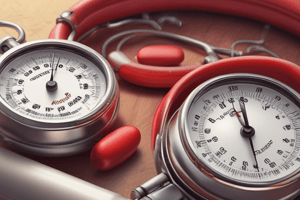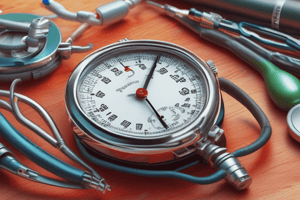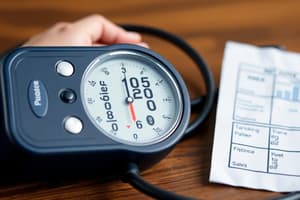Podcast
Questions and Answers
Which of the following is NOT a lifestyle modification recommended for managing hypertension?
Which of the following is NOT a lifestyle modification recommended for managing hypertension?
- Stress management
- Regular exercise
- Weight loss
- Increasing saturated fat intake (correct)
What is the recommended limit for sodium intake per day for individuals with high blood pressure?
What is the recommended limit for sodium intake per day for individuals with high blood pressure?
- 2,300 mg
- 3,000 mg
- 4,000 mg
- 1,500 mg (correct)
What dietary approach is particularly recommended for managing hypertension?
What dietary approach is particularly recommended for managing hypertension?
- DASH Diet (correct)
- Mediterranean Diet
- Paleo Diet
- Ketogenic Diet
Which of the following is NOT a benefit of regular exercise for hypertension management?
Which of the following is NOT a benefit of regular exercise for hypertension management?
How much weight loss can help reduce blood pressure?
How much weight loss can help reduce blood pressure?
What stress-reduction techniques can be beneficial for managing hypertension?
What stress-reduction techniques can be beneficial for managing hypertension?
What is the recommended duration of sleep for managing hypertension?
What is the recommended duration of sleep for managing hypertension?
When are medications typically prescribed for hypertension?
When are medications typically prescribed for hypertension?
Which of the following medications is classified as an ACE inhibitor?
Which of the following medications is classified as an ACE inhibitor?
What is the primary mechanism of action for diuretics in treating hypertension?
What is the primary mechanism of action for diuretics in treating hypertension?
Which medication class primarily works by slowing down the heart rate and decreasing the heart's workload?
Which medication class primarily works by slowing down the heart rate and decreasing the heart's workload?
What is the recommended blood pressure goal for most adults with hypertension?
What is the recommended blood pressure goal for most adults with hypertension?
Which of the following is NOT a common combination therapy for hypertension?
Which of the following is NOT a common combination therapy for hypertension?
Which of the following conditions may benefit from ACE inhibitors or ARBs?
Which of the following conditions may benefit from ACE inhibitors or ARBs?
Aliskiren belongs to which medication class for hypertension?
Aliskiren belongs to which medication class for hypertension?
What is the term used to describe a situation where blood pressure is elevated only when measured in a doctor's office?
What is the term used to describe a situation where blood pressure is elevated only when measured in a doctor's office?
What is the primary goal of regular blood pressure monitoring in managing hypertension?
What is the primary goal of regular blood pressure monitoring in managing hypertension?
Which of the following medications is considered safe for use during pregnancy in cases of gestational hypertension?
Which of the following medications is considered safe for use during pregnancy in cases of gestational hypertension?
Which of the following medications is classified as a central alpha agonist?
Which of the following medications is classified as a central alpha agonist?
What is the term for a medical emergency caused by extremely high blood pressure?
What is the term for a medical emergency caused by extremely high blood pressure?
What are the advantages of combining two or more medications to treat hypertension?
What are the advantages of combining two or more medications to treat hypertension?
Which of the following is NOT a symptom of a hypertensive crisis?
Which of the following is NOT a symptom of a hypertensive crisis?
What is the most effective way to manage hypertension?
What is the most effective way to manage hypertension?
What is the recommended approach when managing hypertension in older adults?
What is the recommended approach when managing hypertension in older adults?
Flashcards
Diuretics
Diuretics
Medications that help eliminate excess salt and water, lowering blood volume and pressure.
ACE Inhibitors
ACE Inhibitors
Drugs like lisinopril that relax blood vessels by blocking angiotensin II, improving blood flow.
ABPM
ABPM
Ambulatory Blood Pressure Monitoring (ABPM) tracks blood pressure over 24 hours to diagnose conditions like white coat hypertension.
Angiotensin II Receptor Blockers (ARBs)
Angiotensin II Receptor Blockers (ARBs)
Signup and view all the flashcards
White Coat Hypertension
White Coat Hypertension
Signup and view all the flashcards
Calcium Channel Blockers
Calcium Channel Blockers
Signup and view all the flashcards
Elderly Hypertension Management
Elderly Hypertension Management
Signup and view all the flashcards
Beta-Blockers
Beta-Blockers
Signup and view all the flashcards
Diabetes and Hypertension
Diabetes and Hypertension
Signup and view all the flashcards
Renin Inhibitors
Renin Inhibitors
Signup and view all the flashcards
Hypertension in CKD
Hypertension in CKD
Signup and view all the flashcards
Combination Therapy
Combination Therapy
Signup and view all the flashcards
Treatment Goals for Hypertension
Treatment Goals for Hypertension
Signup and view all the flashcards
Regular Monitoring and Follow-Up
Regular Monitoring and Follow-Up
Signup and view all the flashcards
Hypertensive Crisis
Hypertensive Crisis
Signup and view all the flashcards
Lifestyle Changes for Hypertension
Lifestyle Changes for Hypertension
Signup and view all the flashcards
Hypertension
Hypertension
Signup and view all the flashcards
DASH Diet
DASH Diet
Signup and view all the flashcards
Sodium Intake
Sodium Intake
Signup and view all the flashcards
Potassium
Potassium
Signup and view all the flashcards
Weight Loss
Weight Loss
Signup and view all the flashcards
Alcohol Intake
Alcohol Intake
Signup and view all the flashcards
Smoke Cessation
Smoke Cessation
Signup and view all the flashcards
Stress Management
Stress Management
Signup and view all the flashcards
Study Notes
Hypertension Management
- Hypertension is consistently high blood pressure against artery walls, leading to serious health issues like heart disease, stroke, and kidney damage.
Lifestyle Modifications
-
Lifestyle changes are crucial in managing hypertension, especially in mild to moderate cases. These changes may even reduce the need for medication.
-
Dietary Modifications
- DASH Diet (Dietary Approaches to Stop Hypertension): Emphasizes fruits, vegetables, whole grains, lean proteins, and low-fat dairy, reducing saturated fats, cholesterol, and sodium.
- Reduce Salt Intake: Limit sodium to less than 2,300 mg per day (ideally 1,500 mg for those with high blood pressure).
- Increase Potassium: Consume potassium-rich foods (bananas, sweet potatoes, spinach) to help balance sodium.
-
Weight Loss: Losing even 5-10% of body weight can help reduce blood pressure. Regular physical activity, like 30 minutes of moderate exercise 5 days a week (walking, cycling, swimming) is beneficial.
-
Reduce Alcohol Intake: Limit to one drink per day for women and two for men.
-
Quit Smoking: Smoking increases blood pressure and is a contributing factor to cardiovascular disease. Quitting is crucial.
-
Stress Management: Techniques like yoga, meditation, and deep breathing exercises can help manage hypertension.
-
Adequate Sleep: Getting 7-9 hours of sleep per night is recommended for managing hypertension. Poor sleep can worsen hypertension.
Pharmacological Management
- Medications are used when lifestyle changes are insufficient or if blood pressure is significantly high.
- Diuretics (Thiazide diuretics): Common first-line treatment to eliminate excess salt and water to reduce blood volume.
- ACE Inhibitors: Relax blood vessels by blocking the hormone angiotensin II, preventing constriction.
- Angiotensin II Receptor Blockers (ARBs): Similar to ACE inhibitors but with fewer side effects.
- Calcium Channel Blockers: Relax blood vessels by reducing heart rate, lowering blood pressure.
- Beta-Blockers: Slow heart rate and reduce the heart's workload, resulting in lower blood pressure.
- Renin Inhibitors: Reduce the production of renin, an enzyme that raises blood pressure by increasing angiotensin II.
- Alpha-Blockers: Relax blood vessels and increase blood flow.
- Central Alpha Agonists: Decrease nerve signals that tighten blood vessels.
Combination Therapy
- A combination of two or more medications is often used to achieve better blood pressure control.
Monitoring and Follow-Up
- Regular blood pressure monitoring is essential to assess treatment effectiveness.
- Follow-up appointments are needed for adjustments to the treatment plan.
- Ambulatory Blood Pressure Monitoring (ABPM) can provide more accurate results.
Managing Hypertension in Special Populations
- In the elderly, a gradual approach to lowering blood pressure is recommended to avoid complications.
- Patients with comorbidities (such as diabetes or CKD) may require specific medication adjustments (e.g. ACE inhibitors, ARBs), protecting the kidneys.
- Hypertension during pregnancy (gestational hypertension) requires careful monitoring.
Treatment Goals
- The goal for most adults is to lower blood pressure to less than 130/80 mmHg.
Emergency Care
- Hypertensive crisis (blood pressure above 180/120 mmHg) is a medical emergency that requires immediate medical attention. Symptoms include severe headache, chest pain, shortness of breath, blurred vision, and nausea.
Studying That Suits You
Use AI to generate personalized quizzes and flashcards to suit your learning preferences.




